Was Pear Harbor an Intelligence Failure? Analysis 2022
VerifiedAdded on 2022/09/27
|10
|3301
|20
AI Summary
Contribute Materials
Your contribution can guide someone’s learning journey. Share your
documents today.
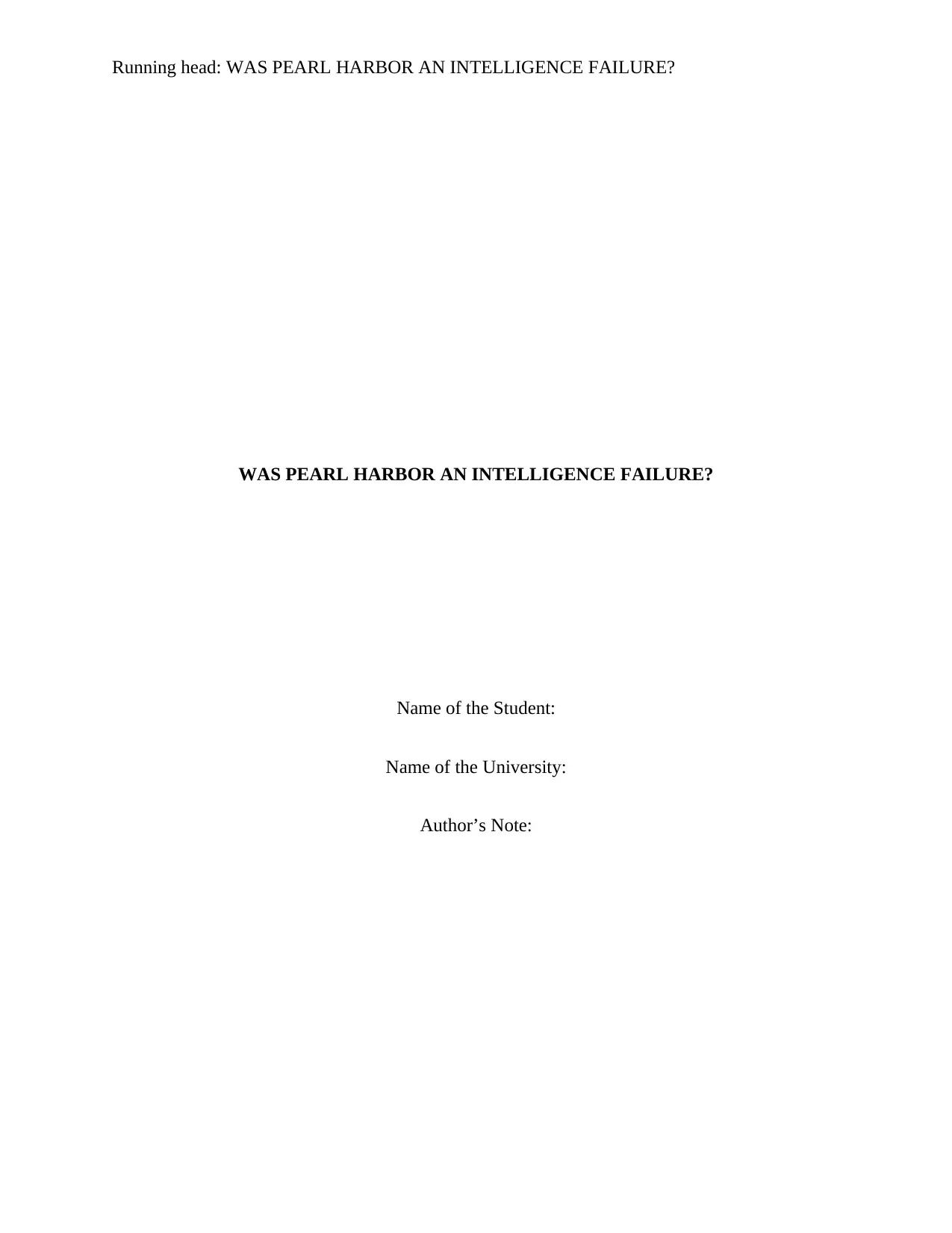
Running head: WAS PEARL HARBOR AN INTELLIGENCE FAILURE?
WAS PEARL HARBOR AN INTELLIGENCE FAILURE?
Name of the Student:
Name of the University:
Author’s Note:
WAS PEARL HARBOR AN INTELLIGENCE FAILURE?
Name of the Student:
Name of the University:
Author’s Note:
Secure Best Marks with AI Grader
Need help grading? Try our AI Grader for instant feedback on your assignments.
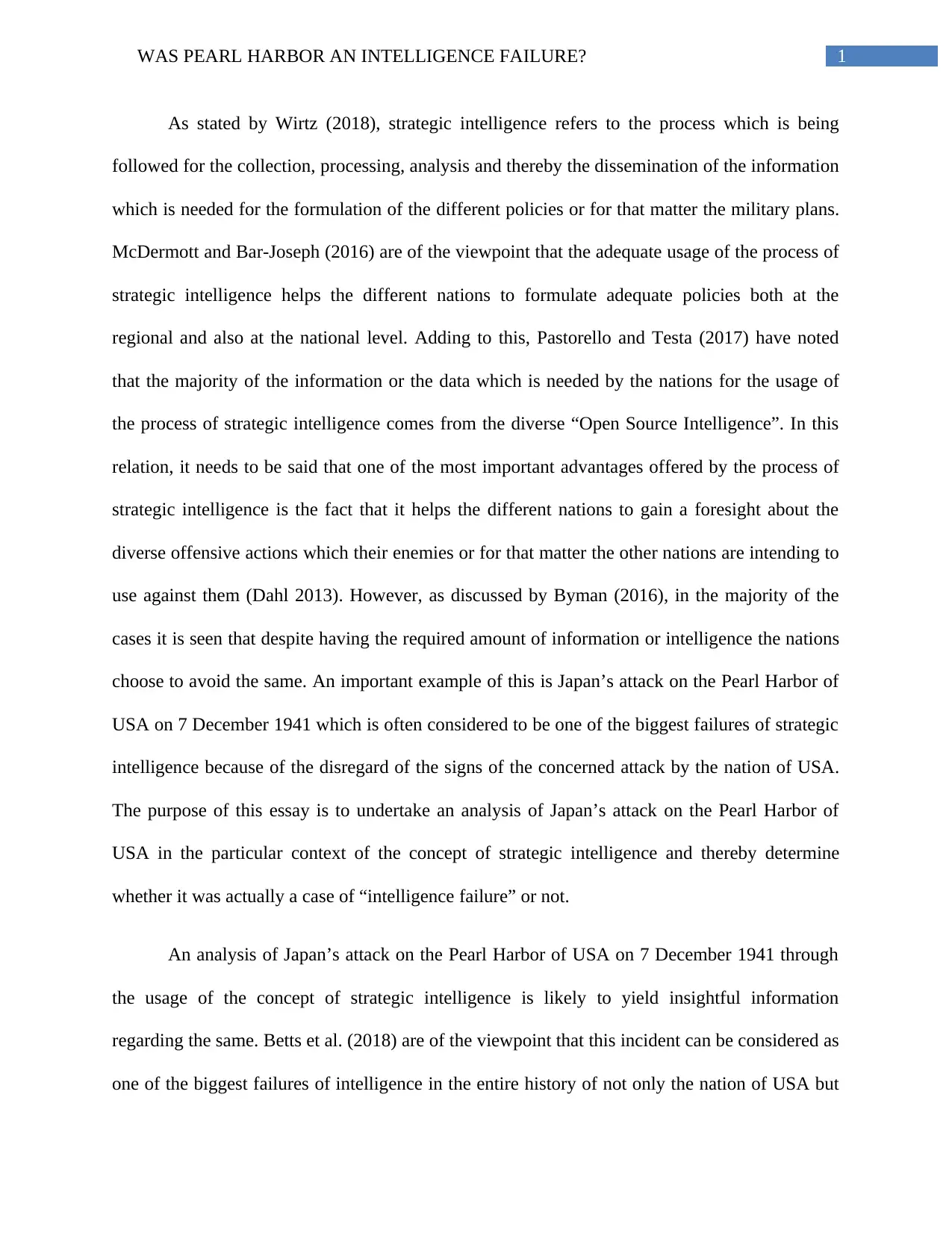
1WAS PEARL HARBOR AN INTELLIGENCE FAILURE?
As stated by Wirtz (2018), strategic intelligence refers to the process which is being
followed for the collection, processing, analysis and thereby the dissemination of the information
which is needed for the formulation of the different policies or for that matter the military plans.
McDermott and Bar-Joseph (2016) are of the viewpoint that the adequate usage of the process of
strategic intelligence helps the different nations to formulate adequate policies both at the
regional and also at the national level. Adding to this, Pastorello and Testa (2017) have noted
that the majority of the information or the data which is needed by the nations for the usage of
the process of strategic intelligence comes from the diverse “Open Source Intelligence”. In this
relation, it needs to be said that one of the most important advantages offered by the process of
strategic intelligence is the fact that it helps the different nations to gain a foresight about the
diverse offensive actions which their enemies or for that matter the other nations are intending to
use against them (Dahl 2013). However, as discussed by Byman (2016), in the majority of the
cases it is seen that despite having the required amount of information or intelligence the nations
choose to avoid the same. An important example of this is Japan’s attack on the Pearl Harbor of
USA on 7 December 1941 which is often considered to be one of the biggest failures of strategic
intelligence because of the disregard of the signs of the concerned attack by the nation of USA.
The purpose of this essay is to undertake an analysis of Japan’s attack on the Pearl Harbor of
USA in the particular context of the concept of strategic intelligence and thereby determine
whether it was actually a case of “intelligence failure” or not.
An analysis of Japan’s attack on the Pearl Harbor of USA on 7 December 1941 through
the usage of the concept of strategic intelligence is likely to yield insightful information
regarding the same. Betts et al. (2018) are of the viewpoint that this incident can be considered as
one of the biggest failures of intelligence in the entire history of not only the nation of USA but
As stated by Wirtz (2018), strategic intelligence refers to the process which is being
followed for the collection, processing, analysis and thereby the dissemination of the information
which is needed for the formulation of the different policies or for that matter the military plans.
McDermott and Bar-Joseph (2016) are of the viewpoint that the adequate usage of the process of
strategic intelligence helps the different nations to formulate adequate policies both at the
regional and also at the national level. Adding to this, Pastorello and Testa (2017) have noted
that the majority of the information or the data which is needed by the nations for the usage of
the process of strategic intelligence comes from the diverse “Open Source Intelligence”. In this
relation, it needs to be said that one of the most important advantages offered by the process of
strategic intelligence is the fact that it helps the different nations to gain a foresight about the
diverse offensive actions which their enemies or for that matter the other nations are intending to
use against them (Dahl 2013). However, as discussed by Byman (2016), in the majority of the
cases it is seen that despite having the required amount of information or intelligence the nations
choose to avoid the same. An important example of this is Japan’s attack on the Pearl Harbor of
USA on 7 December 1941 which is often considered to be one of the biggest failures of strategic
intelligence because of the disregard of the signs of the concerned attack by the nation of USA.
The purpose of this essay is to undertake an analysis of Japan’s attack on the Pearl Harbor of
USA in the particular context of the concept of strategic intelligence and thereby determine
whether it was actually a case of “intelligence failure” or not.
An analysis of Japan’s attack on the Pearl Harbor of USA on 7 December 1941 through
the usage of the concept of strategic intelligence is likely to yield insightful information
regarding the same. Betts et al. (2018) are of the viewpoint that this incident can be considered as
one of the biggest failures of intelligence in the entire history of not only the nation of USA but
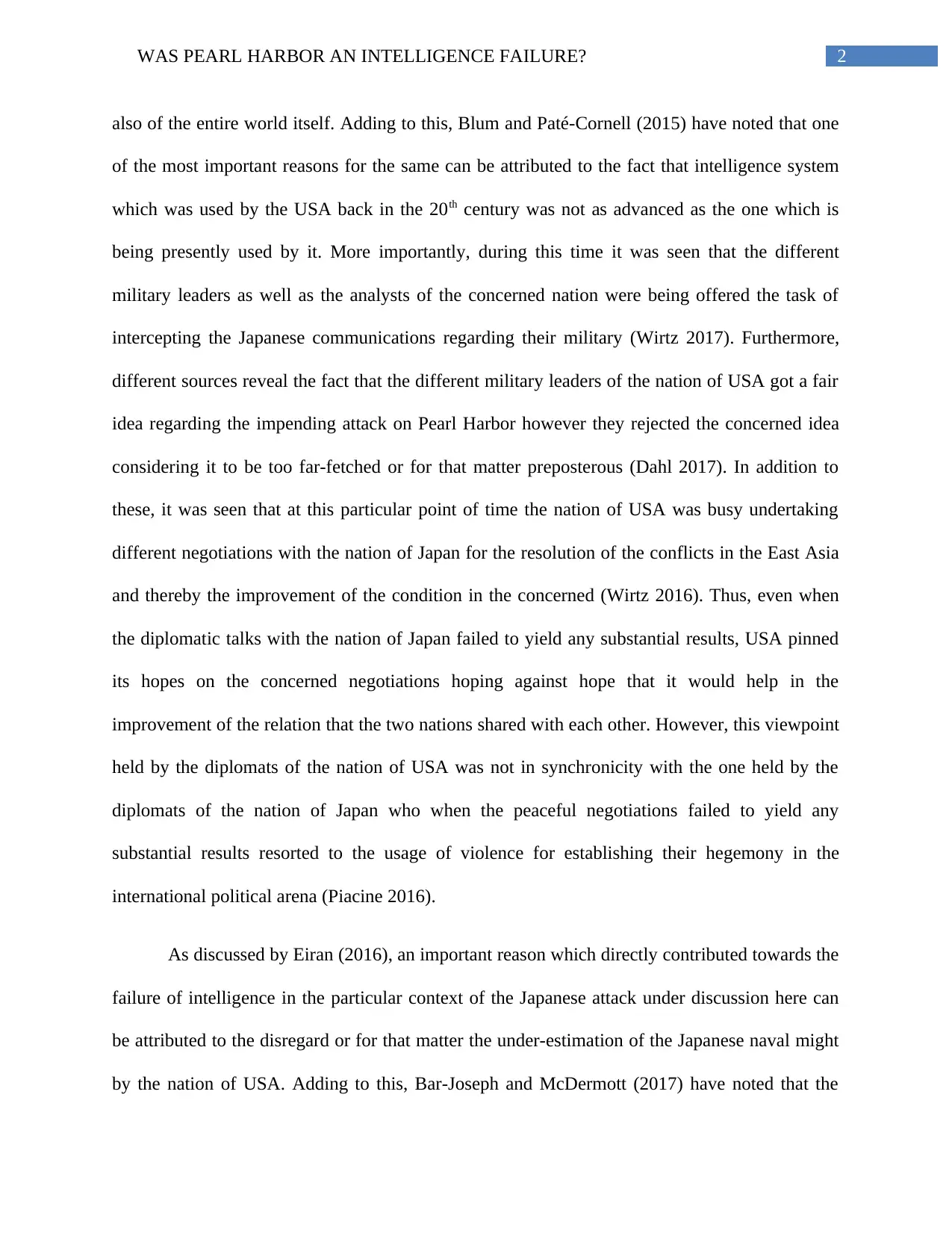
2WAS PEARL HARBOR AN INTELLIGENCE FAILURE?
also of the entire world itself. Adding to this, Blum and Paté-Cornell (2015) have noted that one
of the most important reasons for the same can be attributed to the fact that intelligence system
which was used by the USA back in the 20th century was not as advanced as the one which is
being presently used by it. More importantly, during this time it was seen that the different
military leaders as well as the analysts of the concerned nation were being offered the task of
intercepting the Japanese communications regarding their military (Wirtz 2017). Furthermore,
different sources reveal the fact that the different military leaders of the nation of USA got a fair
idea regarding the impending attack on Pearl Harbor however they rejected the concerned idea
considering it to be too far-fetched or for that matter preposterous (Dahl 2017). In addition to
these, it was seen that at this particular point of time the nation of USA was busy undertaking
different negotiations with the nation of Japan for the resolution of the conflicts in the East Asia
and thereby the improvement of the condition in the concerned (Wirtz 2016). Thus, even when
the diplomatic talks with the nation of Japan failed to yield any substantial results, USA pinned
its hopes on the concerned negotiations hoping against hope that it would help in the
improvement of the relation that the two nations shared with each other. However, this viewpoint
held by the diplomats of the nation of USA was not in synchronicity with the one held by the
diplomats of the nation of Japan who when the peaceful negotiations failed to yield any
substantial results resorted to the usage of violence for establishing their hegemony in the
international political arena (Piacine 2016).
As discussed by Eiran (2016), an important reason which directly contributed towards the
failure of intelligence in the particular context of the Japanese attack under discussion here can
be attributed to the disregard or for that matter the under-estimation of the Japanese naval might
by the nation of USA. Adding to this, Bar-Joseph and McDermott (2017) have noted that the
also of the entire world itself. Adding to this, Blum and Paté-Cornell (2015) have noted that one
of the most important reasons for the same can be attributed to the fact that intelligence system
which was used by the USA back in the 20th century was not as advanced as the one which is
being presently used by it. More importantly, during this time it was seen that the different
military leaders as well as the analysts of the concerned nation were being offered the task of
intercepting the Japanese communications regarding their military (Wirtz 2017). Furthermore,
different sources reveal the fact that the different military leaders of the nation of USA got a fair
idea regarding the impending attack on Pearl Harbor however they rejected the concerned idea
considering it to be too far-fetched or for that matter preposterous (Dahl 2017). In addition to
these, it was seen that at this particular point of time the nation of USA was busy undertaking
different negotiations with the nation of Japan for the resolution of the conflicts in the East Asia
and thereby the improvement of the condition in the concerned (Wirtz 2016). Thus, even when
the diplomatic talks with the nation of Japan failed to yield any substantial results, USA pinned
its hopes on the concerned negotiations hoping against hope that it would help in the
improvement of the relation that the two nations shared with each other. However, this viewpoint
held by the diplomats of the nation of USA was not in synchronicity with the one held by the
diplomats of the nation of Japan who when the peaceful negotiations failed to yield any
substantial results resorted to the usage of violence for establishing their hegemony in the
international political arena (Piacine 2016).
As discussed by Eiran (2016), an important reason which directly contributed towards the
failure of intelligence in the particular context of the Japanese attack under discussion here can
be attributed to the disregard or for that matter the under-estimation of the Japanese naval might
by the nation of USA. Adding to this, Bar-Joseph and McDermott (2017) have noted that the
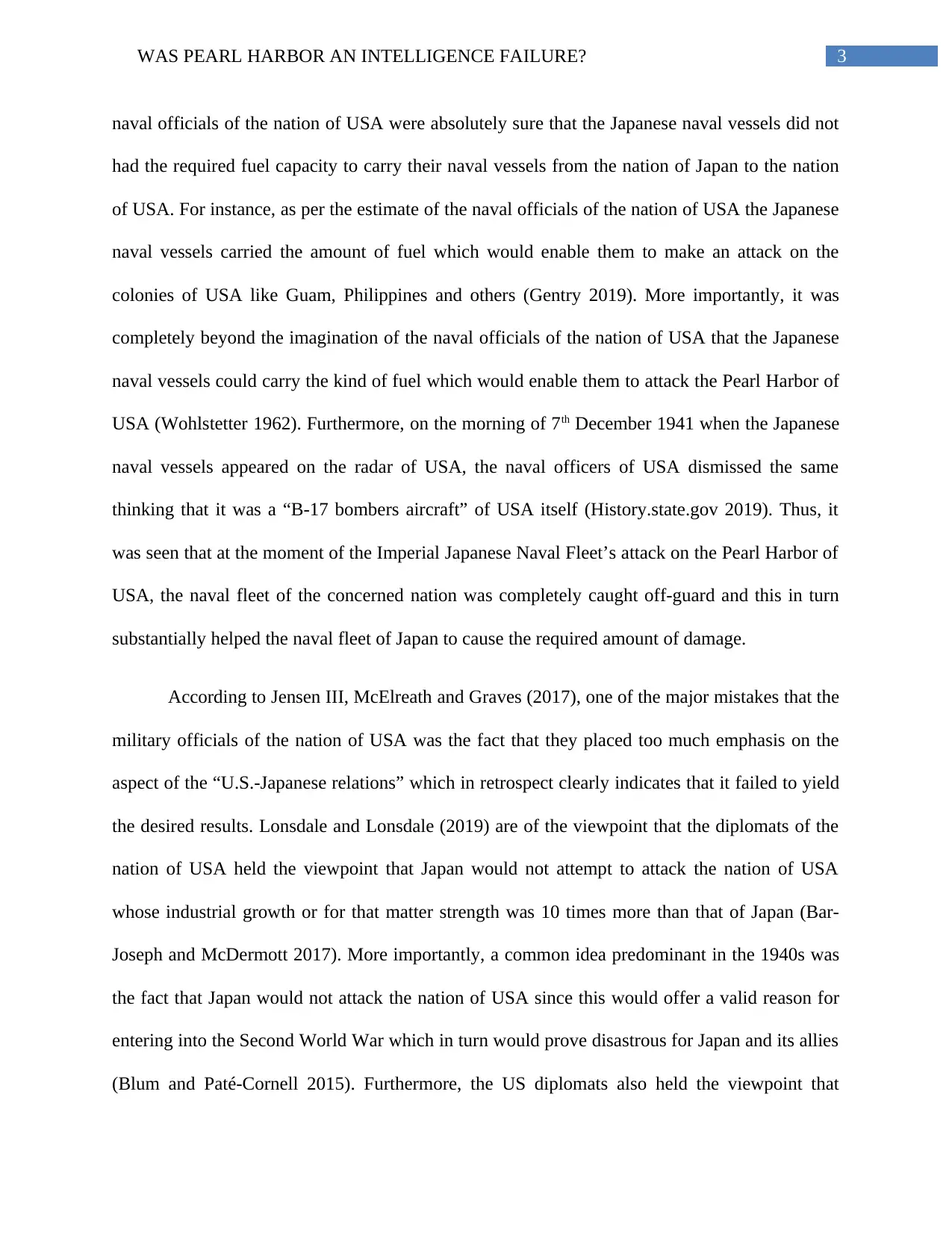
3WAS PEARL HARBOR AN INTELLIGENCE FAILURE?
naval officials of the nation of USA were absolutely sure that the Japanese naval vessels did not
had the required fuel capacity to carry their naval vessels from the nation of Japan to the nation
of USA. For instance, as per the estimate of the naval officials of the nation of USA the Japanese
naval vessels carried the amount of fuel which would enable them to make an attack on the
colonies of USA like Guam, Philippines and others (Gentry 2019). More importantly, it was
completely beyond the imagination of the naval officials of the nation of USA that the Japanese
naval vessels could carry the kind of fuel which would enable them to attack the Pearl Harbor of
USA (Wohlstetter 1962). Furthermore, on the morning of 7th December 1941 when the Japanese
naval vessels appeared on the radar of USA, the naval officers of USA dismissed the same
thinking that it was a “B-17 bombers aircraft” of USA itself (History.state.gov 2019). Thus, it
was seen that at the moment of the Imperial Japanese Naval Fleet’s attack on the Pearl Harbor of
USA, the naval fleet of the concerned nation was completely caught off-guard and this in turn
substantially helped the naval fleet of Japan to cause the required amount of damage.
According to Jensen III, McElreath and Graves (2017), one of the major mistakes that the
military officials of the nation of USA was the fact that they placed too much emphasis on the
aspect of the “U.S.-Japanese relations” which in retrospect clearly indicates that it failed to yield
the desired results. Lonsdale and Lonsdale (2019) are of the viewpoint that the diplomats of the
nation of USA held the viewpoint that Japan would not attempt to attack the nation of USA
whose industrial growth or for that matter strength was 10 times more than that of Japan (Bar-
Joseph and McDermott 2017). More importantly, a common idea predominant in the 1940s was
the fact that Japan would not attack the nation of USA since this would offer a valid reason for
entering into the Second World War which in turn would prove disastrous for Japan and its allies
(Blum and Paté-Cornell 2015). Furthermore, the US diplomats also held the viewpoint that
naval officials of the nation of USA were absolutely sure that the Japanese naval vessels did not
had the required fuel capacity to carry their naval vessels from the nation of Japan to the nation
of USA. For instance, as per the estimate of the naval officials of the nation of USA the Japanese
naval vessels carried the amount of fuel which would enable them to make an attack on the
colonies of USA like Guam, Philippines and others (Gentry 2019). More importantly, it was
completely beyond the imagination of the naval officials of the nation of USA that the Japanese
naval vessels could carry the kind of fuel which would enable them to attack the Pearl Harbor of
USA (Wohlstetter 1962). Furthermore, on the morning of 7th December 1941 when the Japanese
naval vessels appeared on the radar of USA, the naval officers of USA dismissed the same
thinking that it was a “B-17 bombers aircraft” of USA itself (History.state.gov 2019). Thus, it
was seen that at the moment of the Imperial Japanese Naval Fleet’s attack on the Pearl Harbor of
USA, the naval fleet of the concerned nation was completely caught off-guard and this in turn
substantially helped the naval fleet of Japan to cause the required amount of damage.
According to Jensen III, McElreath and Graves (2017), one of the major mistakes that the
military officials of the nation of USA was the fact that they placed too much emphasis on the
aspect of the “U.S.-Japanese relations” which in retrospect clearly indicates that it failed to yield
the desired results. Lonsdale and Lonsdale (2019) are of the viewpoint that the diplomats of the
nation of USA held the viewpoint that Japan would not attempt to attack the nation of USA
whose industrial growth or for that matter strength was 10 times more than that of Japan (Bar-
Joseph and McDermott 2017). More importantly, a common idea predominant in the 1940s was
the fact that Japan would not attack the nation of USA since this would offer a valid reason for
entering into the Second World War which in turn would prove disastrous for Japan and its allies
(Blum and Paté-Cornell 2015). Furthermore, the US diplomats also held the viewpoint that
Secure Best Marks with AI Grader
Need help grading? Try our AI Grader for instant feedback on your assignments.
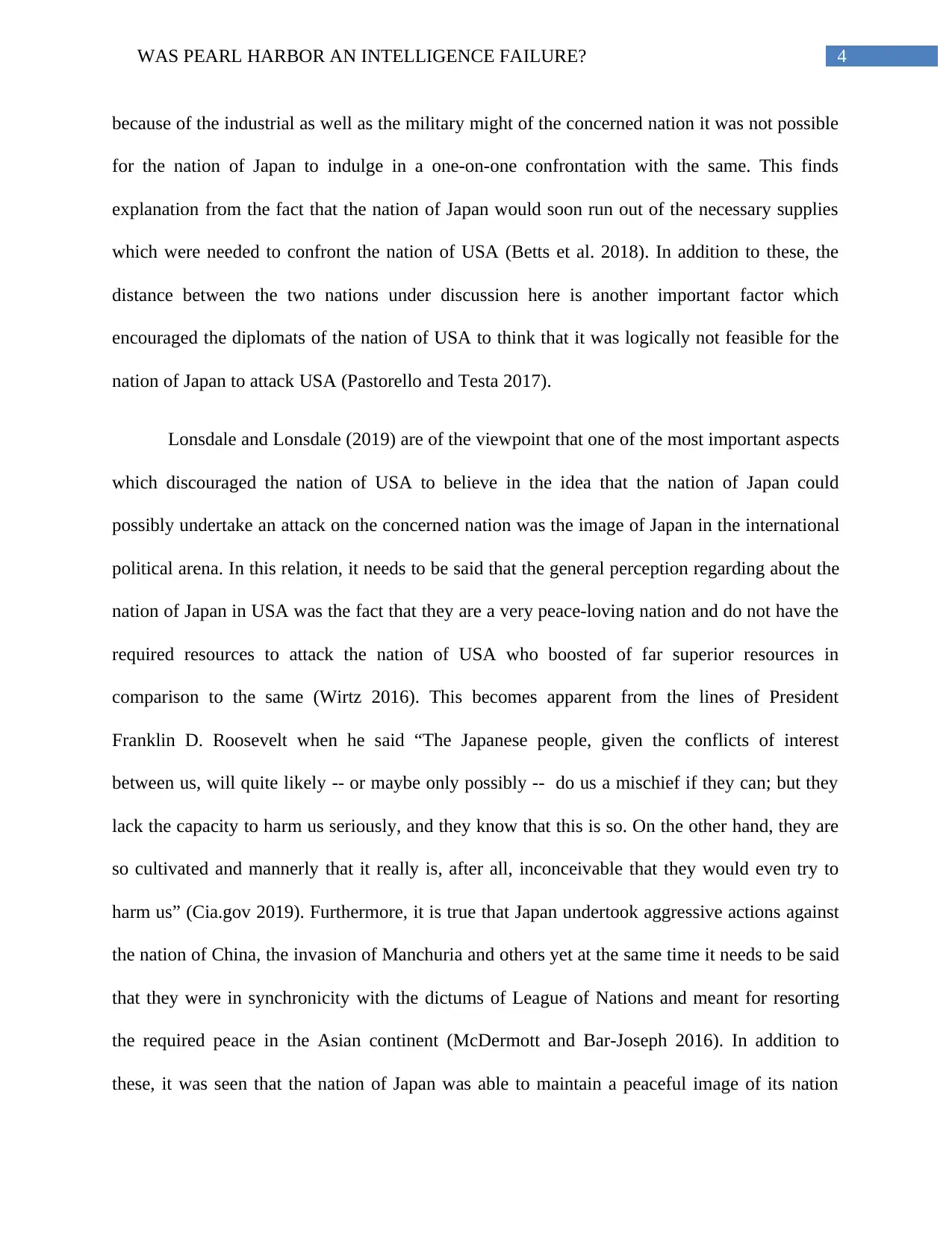
4WAS PEARL HARBOR AN INTELLIGENCE FAILURE?
because of the industrial as well as the military might of the concerned nation it was not possible
for the nation of Japan to indulge in a one-on-one confrontation with the same. This finds
explanation from the fact that the nation of Japan would soon run out of the necessary supplies
which were needed to confront the nation of USA (Betts et al. 2018). In addition to these, the
distance between the two nations under discussion here is another important factor which
encouraged the diplomats of the nation of USA to think that it was logically not feasible for the
nation of Japan to attack USA (Pastorello and Testa 2017).
Lonsdale and Lonsdale (2019) are of the viewpoint that one of the most important aspects
which discouraged the nation of USA to believe in the idea that the nation of Japan could
possibly undertake an attack on the concerned nation was the image of Japan in the international
political arena. In this relation, it needs to be said that the general perception regarding about the
nation of Japan in USA was the fact that they are a very peace-loving nation and do not have the
required resources to attack the nation of USA who boosted of far superior resources in
comparison to the same (Wirtz 2016). This becomes apparent from the lines of President
Franklin D. Roosevelt when he said “The Japanese people, given the conflicts of interest
between us, will quite likely -- or maybe only possibly -- do us a mischief if they can; but they
lack the capacity to harm us seriously, and they know that this is so. On the other hand, they are
so cultivated and mannerly that it really is, after all, inconceivable that they would even try to
harm us” (Cia.gov 2019). Furthermore, it is true that Japan undertook aggressive actions against
the nation of China, the invasion of Manchuria and others yet at the same time it needs to be said
that they were in synchronicity with the dictums of League of Nations and meant for resorting
the required peace in the Asian continent (McDermott and Bar-Joseph 2016). In addition to
these, it was seen that the nation of Japan was able to maintain a peaceful image of its nation
because of the industrial as well as the military might of the concerned nation it was not possible
for the nation of Japan to indulge in a one-on-one confrontation with the same. This finds
explanation from the fact that the nation of Japan would soon run out of the necessary supplies
which were needed to confront the nation of USA (Betts et al. 2018). In addition to these, the
distance between the two nations under discussion here is another important factor which
encouraged the diplomats of the nation of USA to think that it was logically not feasible for the
nation of Japan to attack USA (Pastorello and Testa 2017).
Lonsdale and Lonsdale (2019) are of the viewpoint that one of the most important aspects
which discouraged the nation of USA to believe in the idea that the nation of Japan could
possibly undertake an attack on the concerned nation was the image of Japan in the international
political arena. In this relation, it needs to be said that the general perception regarding about the
nation of Japan in USA was the fact that they are a very peace-loving nation and do not have the
required resources to attack the nation of USA who boosted of far superior resources in
comparison to the same (Wirtz 2016). This becomes apparent from the lines of President
Franklin D. Roosevelt when he said “The Japanese people, given the conflicts of interest
between us, will quite likely -- or maybe only possibly -- do us a mischief if they can; but they
lack the capacity to harm us seriously, and they know that this is so. On the other hand, they are
so cultivated and mannerly that it really is, after all, inconceivable that they would even try to
harm us” (Cia.gov 2019). Furthermore, it is true that Japan undertook aggressive actions against
the nation of China, the invasion of Manchuria and others yet at the same time it needs to be said
that they were in synchronicity with the dictums of League of Nations and meant for resorting
the required peace in the Asian continent (McDermott and Bar-Joseph 2016). In addition to
these, it was seen that the nation of Japan was able to maintain a peaceful image of its nation
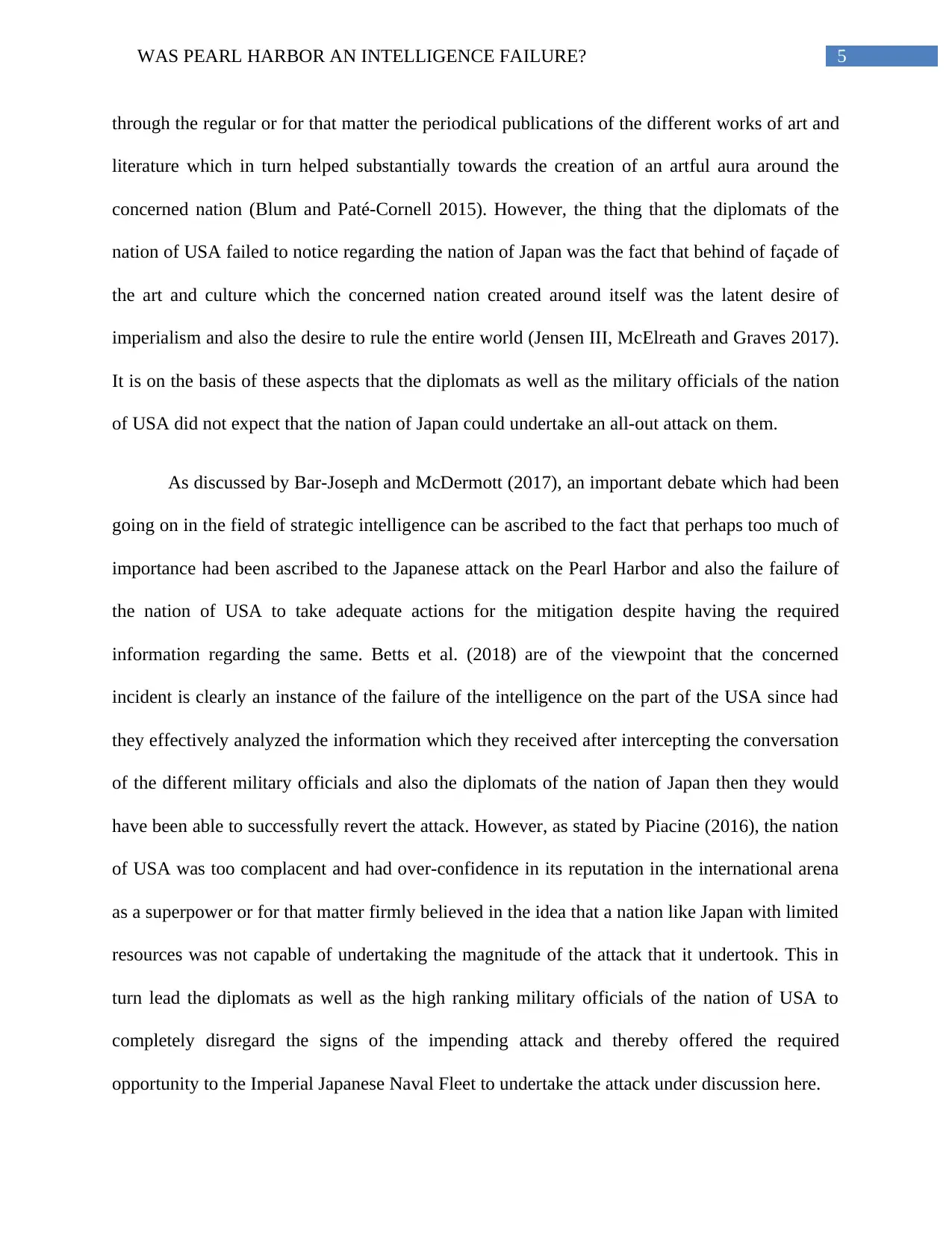
5WAS PEARL HARBOR AN INTELLIGENCE FAILURE?
through the regular or for that matter the periodical publications of the different works of art and
literature which in turn helped substantially towards the creation of an artful aura around the
concerned nation (Blum and Paté-Cornell 2015). However, the thing that the diplomats of the
nation of USA failed to notice regarding the nation of Japan was the fact that behind of façade of
the art and culture which the concerned nation created around itself was the latent desire of
imperialism and also the desire to rule the entire world (Jensen III, McElreath and Graves 2017).
It is on the basis of these aspects that the diplomats as well as the military officials of the nation
of USA did not expect that the nation of Japan could undertake an all-out attack on them.
As discussed by Bar-Joseph and McDermott (2017), an important debate which had been
going on in the field of strategic intelligence can be ascribed to the fact that perhaps too much of
importance had been ascribed to the Japanese attack on the Pearl Harbor and also the failure of
the nation of USA to take adequate actions for the mitigation despite having the required
information regarding the same. Betts et al. (2018) are of the viewpoint that the concerned
incident is clearly an instance of the failure of the intelligence on the part of the USA since had
they effectively analyzed the information which they received after intercepting the conversation
of the different military officials and also the diplomats of the nation of Japan then they would
have been able to successfully revert the attack. However, as stated by Piacine (2016), the nation
of USA was too complacent and had over-confidence in its reputation in the international arena
as a superpower or for that matter firmly believed in the idea that a nation like Japan with limited
resources was not capable of undertaking the magnitude of the attack that it undertook. This in
turn lead the diplomats as well as the high ranking military officials of the nation of USA to
completely disregard the signs of the impending attack and thereby offered the required
opportunity to the Imperial Japanese Naval Fleet to undertake the attack under discussion here.
through the regular or for that matter the periodical publications of the different works of art and
literature which in turn helped substantially towards the creation of an artful aura around the
concerned nation (Blum and Paté-Cornell 2015). However, the thing that the diplomats of the
nation of USA failed to notice regarding the nation of Japan was the fact that behind of façade of
the art and culture which the concerned nation created around itself was the latent desire of
imperialism and also the desire to rule the entire world (Jensen III, McElreath and Graves 2017).
It is on the basis of these aspects that the diplomats as well as the military officials of the nation
of USA did not expect that the nation of Japan could undertake an all-out attack on them.
As discussed by Bar-Joseph and McDermott (2017), an important debate which had been
going on in the field of strategic intelligence can be ascribed to the fact that perhaps too much of
importance had been ascribed to the Japanese attack on the Pearl Harbor and also the failure of
the nation of USA to take adequate actions for the mitigation despite having the required
information regarding the same. Betts et al. (2018) are of the viewpoint that the concerned
incident is clearly an instance of the failure of the intelligence on the part of the USA since had
they effectively analyzed the information which they received after intercepting the conversation
of the different military officials and also the diplomats of the nation of Japan then they would
have been able to successfully revert the attack. However, as stated by Piacine (2016), the nation
of USA was too complacent and had over-confidence in its reputation in the international arena
as a superpower or for that matter firmly believed in the idea that a nation like Japan with limited
resources was not capable of undertaking the magnitude of the attack that it undertook. This in
turn lead the diplomats as well as the high ranking military officials of the nation of USA to
completely disregard the signs of the impending attack and thereby offered the required
opportunity to the Imperial Japanese Naval Fleet to undertake the attack under discussion here.
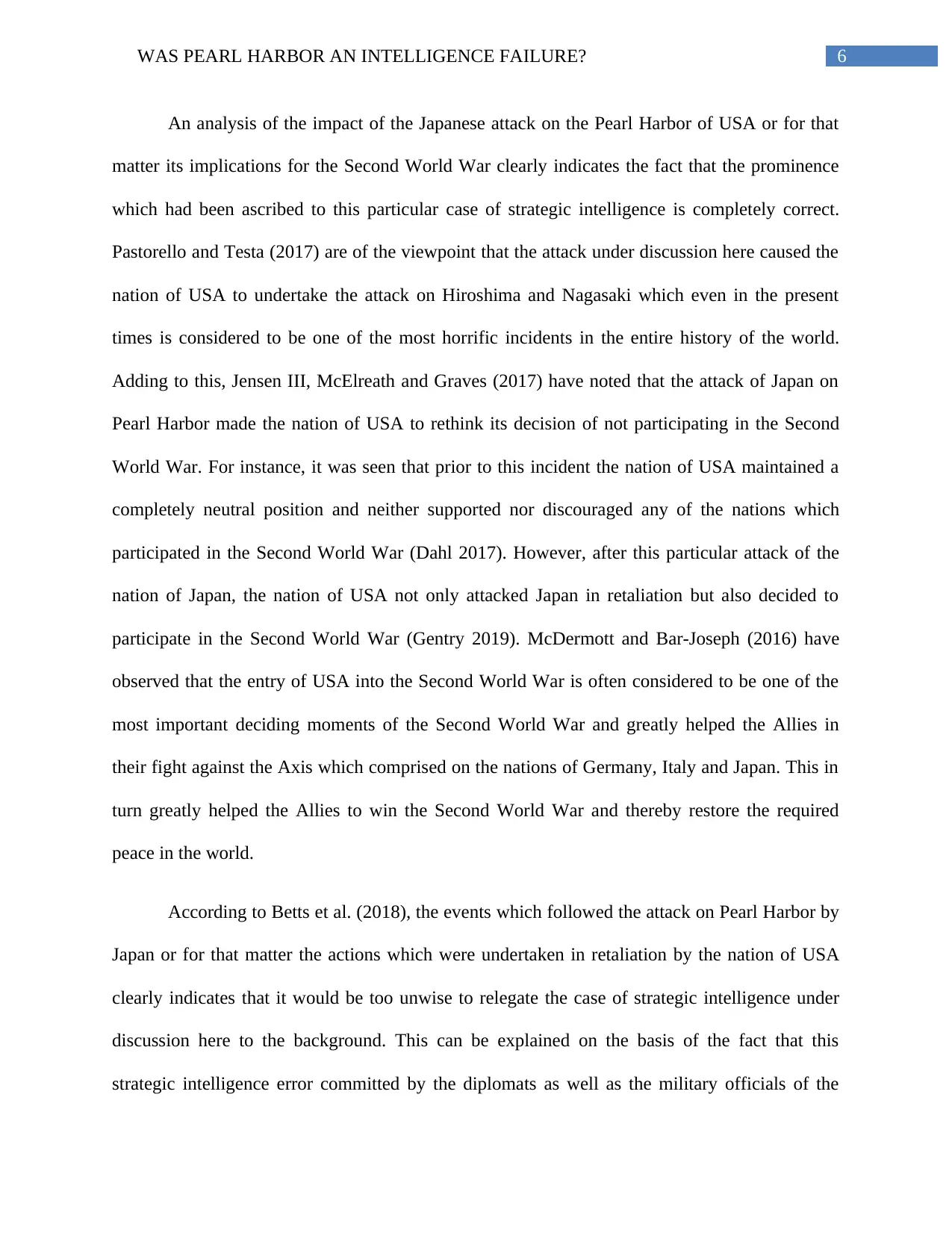
6WAS PEARL HARBOR AN INTELLIGENCE FAILURE?
An analysis of the impact of the Japanese attack on the Pearl Harbor of USA or for that
matter its implications for the Second World War clearly indicates the fact that the prominence
which had been ascribed to this particular case of strategic intelligence is completely correct.
Pastorello and Testa (2017) are of the viewpoint that the attack under discussion here caused the
nation of USA to undertake the attack on Hiroshima and Nagasaki which even in the present
times is considered to be one of the most horrific incidents in the entire history of the world.
Adding to this, Jensen III, McElreath and Graves (2017) have noted that the attack of Japan on
Pearl Harbor made the nation of USA to rethink its decision of not participating in the Second
World War. For instance, it was seen that prior to this incident the nation of USA maintained a
completely neutral position and neither supported nor discouraged any of the nations which
participated in the Second World War (Dahl 2017). However, after this particular attack of the
nation of Japan, the nation of USA not only attacked Japan in retaliation but also decided to
participate in the Second World War (Gentry 2019). McDermott and Bar-Joseph (2016) have
observed that the entry of USA into the Second World War is often considered to be one of the
most important deciding moments of the Second World War and greatly helped the Allies in
their fight against the Axis which comprised on the nations of Germany, Italy and Japan. This in
turn greatly helped the Allies to win the Second World War and thereby restore the required
peace in the world.
According to Betts et al. (2018), the events which followed the attack on Pearl Harbor by
Japan or for that matter the actions which were undertaken in retaliation by the nation of USA
clearly indicates that it would be too unwise to relegate the case of strategic intelligence under
discussion here to the background. This can be explained on the basis of the fact that this
strategic intelligence error committed by the diplomats as well as the military officials of the
An analysis of the impact of the Japanese attack on the Pearl Harbor of USA or for that
matter its implications for the Second World War clearly indicates the fact that the prominence
which had been ascribed to this particular case of strategic intelligence is completely correct.
Pastorello and Testa (2017) are of the viewpoint that the attack under discussion here caused the
nation of USA to undertake the attack on Hiroshima and Nagasaki which even in the present
times is considered to be one of the most horrific incidents in the entire history of the world.
Adding to this, Jensen III, McElreath and Graves (2017) have noted that the attack of Japan on
Pearl Harbor made the nation of USA to rethink its decision of not participating in the Second
World War. For instance, it was seen that prior to this incident the nation of USA maintained a
completely neutral position and neither supported nor discouraged any of the nations which
participated in the Second World War (Dahl 2017). However, after this particular attack of the
nation of Japan, the nation of USA not only attacked Japan in retaliation but also decided to
participate in the Second World War (Gentry 2019). McDermott and Bar-Joseph (2016) have
observed that the entry of USA into the Second World War is often considered to be one of the
most important deciding moments of the Second World War and greatly helped the Allies in
their fight against the Axis which comprised on the nations of Germany, Italy and Japan. This in
turn greatly helped the Allies to win the Second World War and thereby restore the required
peace in the world.
According to Betts et al. (2018), the events which followed the attack on Pearl Harbor by
Japan or for that matter the actions which were undertaken in retaliation by the nation of USA
clearly indicates that it would be too unwise to relegate the case of strategic intelligence under
discussion here to the background. This can be explained on the basis of the fact that this
strategic intelligence error committed by the diplomats as well as the military officials of the
Paraphrase This Document
Need a fresh take? Get an instant paraphrase of this document with our AI Paraphraser
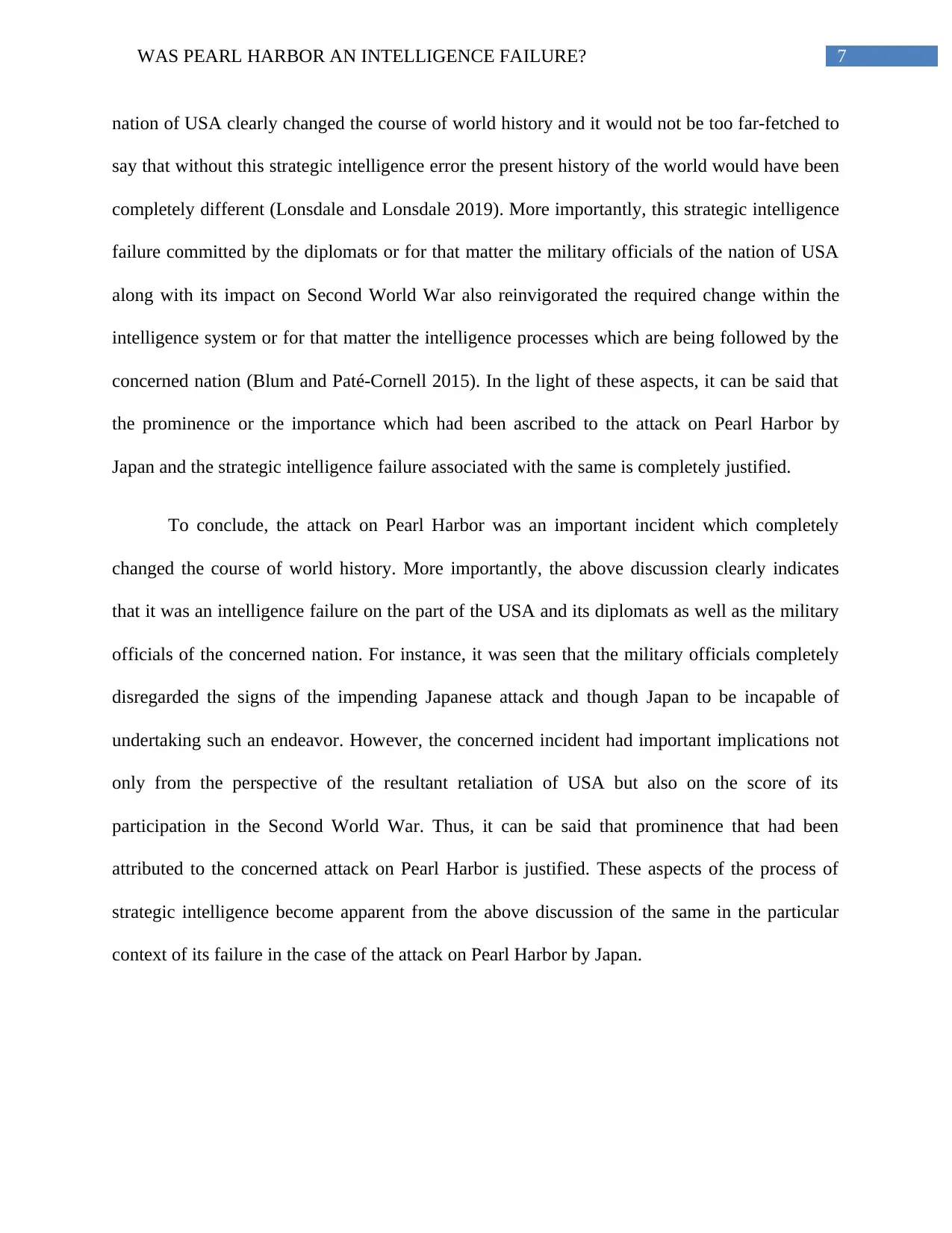
7WAS PEARL HARBOR AN INTELLIGENCE FAILURE?
nation of USA clearly changed the course of world history and it would not be too far-fetched to
say that without this strategic intelligence error the present history of the world would have been
completely different (Lonsdale and Lonsdale 2019). More importantly, this strategic intelligence
failure committed by the diplomats or for that matter the military officials of the nation of USA
along with its impact on Second World War also reinvigorated the required change within the
intelligence system or for that matter the intelligence processes which are being followed by the
concerned nation (Blum and Paté-Cornell 2015). In the light of these aspects, it can be said that
the prominence or the importance which had been ascribed to the attack on Pearl Harbor by
Japan and the strategic intelligence failure associated with the same is completely justified.
To conclude, the attack on Pearl Harbor was an important incident which completely
changed the course of world history. More importantly, the above discussion clearly indicates
that it was an intelligence failure on the part of the USA and its diplomats as well as the military
officials of the concerned nation. For instance, it was seen that the military officials completely
disregarded the signs of the impending Japanese attack and though Japan to be incapable of
undertaking such an endeavor. However, the concerned incident had important implications not
only from the perspective of the resultant retaliation of USA but also on the score of its
participation in the Second World War. Thus, it can be said that prominence that had been
attributed to the concerned attack on Pearl Harbor is justified. These aspects of the process of
strategic intelligence become apparent from the above discussion of the same in the particular
context of its failure in the case of the attack on Pearl Harbor by Japan.
nation of USA clearly changed the course of world history and it would not be too far-fetched to
say that without this strategic intelligence error the present history of the world would have been
completely different (Lonsdale and Lonsdale 2019). More importantly, this strategic intelligence
failure committed by the diplomats or for that matter the military officials of the nation of USA
along with its impact on Second World War also reinvigorated the required change within the
intelligence system or for that matter the intelligence processes which are being followed by the
concerned nation (Blum and Paté-Cornell 2015). In the light of these aspects, it can be said that
the prominence or the importance which had been ascribed to the attack on Pearl Harbor by
Japan and the strategic intelligence failure associated with the same is completely justified.
To conclude, the attack on Pearl Harbor was an important incident which completely
changed the course of world history. More importantly, the above discussion clearly indicates
that it was an intelligence failure on the part of the USA and its diplomats as well as the military
officials of the concerned nation. For instance, it was seen that the military officials completely
disregarded the signs of the impending Japanese attack and though Japan to be incapable of
undertaking such an endeavor. However, the concerned incident had important implications not
only from the perspective of the resultant retaliation of USA but also on the score of its
participation in the Second World War. Thus, it can be said that prominence that had been
attributed to the concerned attack on Pearl Harbor is justified. These aspects of the process of
strategic intelligence become apparent from the above discussion of the same in the particular
context of its failure in the case of the attack on Pearl Harbor by Japan.
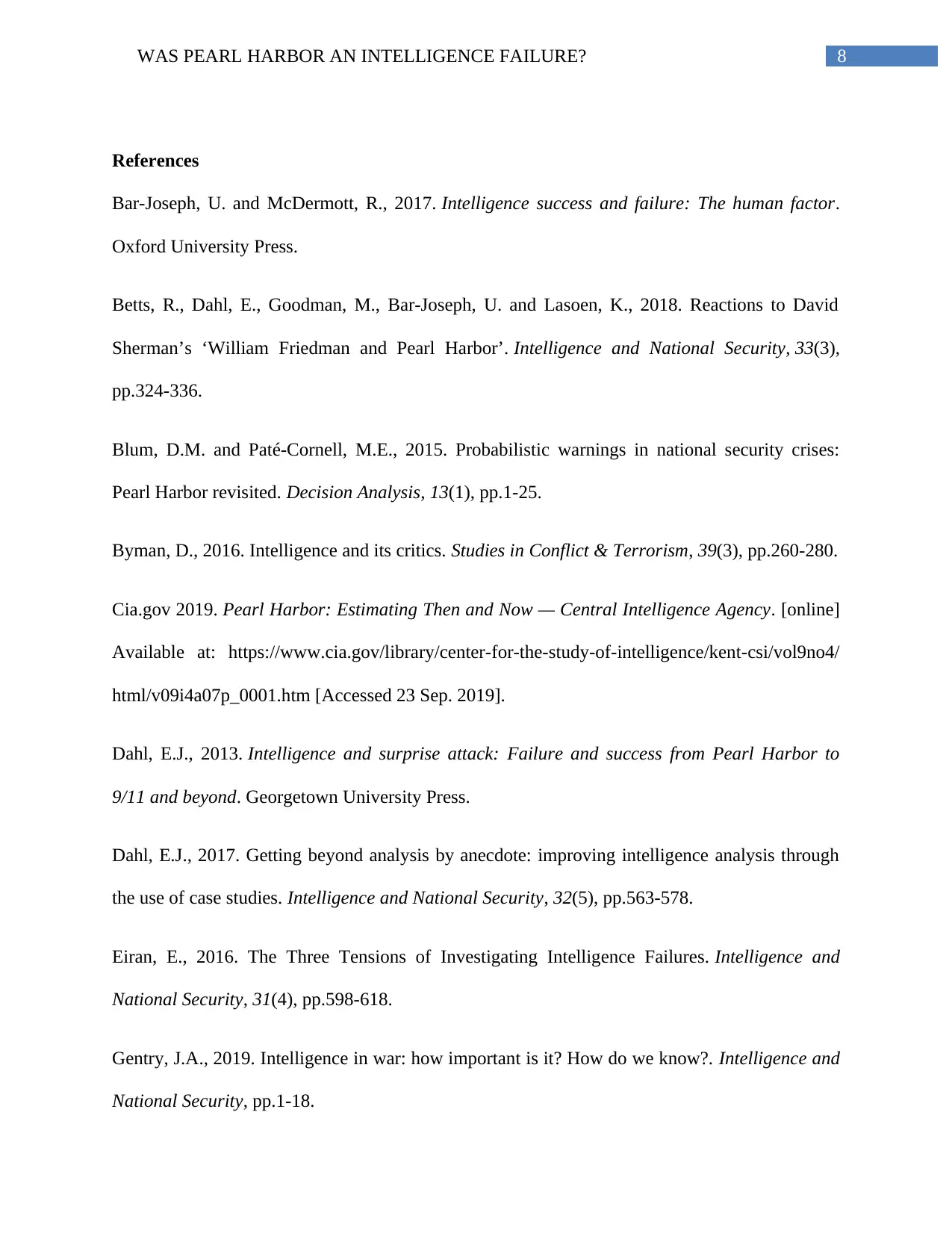
8WAS PEARL HARBOR AN INTELLIGENCE FAILURE?
References
Bar-Joseph, U. and McDermott, R., 2017. Intelligence success and failure: The human factor.
Oxford University Press.
Betts, R., Dahl, E., Goodman, M., Bar-Joseph, U. and Lasoen, K., 2018. Reactions to David
Sherman’s ‘William Friedman and Pearl Harbor’. Intelligence and National Security, 33(3),
pp.324-336.
Blum, D.M. and Paté-Cornell, M.E., 2015. Probabilistic warnings in national security crises:
Pearl Harbor revisited. Decision Analysis, 13(1), pp.1-25.
Byman, D., 2016. Intelligence and its critics. Studies in Conflict & Terrorism, 39(3), pp.260-280.
Cia.gov 2019. Pearl Harbor: Estimating Then and Now — Central Intelligence Agency. [online]
Available at: https://www.cia.gov/library/center-for-the-study-of-intelligence/kent-csi/vol9no4/
html/v09i4a07p_0001.htm [Accessed 23 Sep. 2019].
Dahl, E.J., 2013. Intelligence and surprise attack: Failure and success from Pearl Harbor to
9/11 and beyond. Georgetown University Press.
Dahl, E.J., 2017. Getting beyond analysis by anecdote: improving intelligence analysis through
the use of case studies. Intelligence and National Security, 32(5), pp.563-578.
Eiran, E., 2016. The Three Tensions of Investigating Intelligence Failures. Intelligence and
National Security, 31(4), pp.598-618.
Gentry, J.A., 2019. Intelligence in war: how important is it? How do we know?. Intelligence and
National Security, pp.1-18.
References
Bar-Joseph, U. and McDermott, R., 2017. Intelligence success and failure: The human factor.
Oxford University Press.
Betts, R., Dahl, E., Goodman, M., Bar-Joseph, U. and Lasoen, K., 2018. Reactions to David
Sherman’s ‘William Friedman and Pearl Harbor’. Intelligence and National Security, 33(3),
pp.324-336.
Blum, D.M. and Paté-Cornell, M.E., 2015. Probabilistic warnings in national security crises:
Pearl Harbor revisited. Decision Analysis, 13(1), pp.1-25.
Byman, D., 2016. Intelligence and its critics. Studies in Conflict & Terrorism, 39(3), pp.260-280.
Cia.gov 2019. Pearl Harbor: Estimating Then and Now — Central Intelligence Agency. [online]
Available at: https://www.cia.gov/library/center-for-the-study-of-intelligence/kent-csi/vol9no4/
html/v09i4a07p_0001.htm [Accessed 23 Sep. 2019].
Dahl, E.J., 2013. Intelligence and surprise attack: Failure and success from Pearl Harbor to
9/11 and beyond. Georgetown University Press.
Dahl, E.J., 2017. Getting beyond analysis by anecdote: improving intelligence analysis through
the use of case studies. Intelligence and National Security, 32(5), pp.563-578.
Eiran, E., 2016. The Three Tensions of Investigating Intelligence Failures. Intelligence and
National Security, 31(4), pp.598-618.
Gentry, J.A., 2019. Intelligence in war: how important is it? How do we know?. Intelligence and
National Security, pp.1-18.
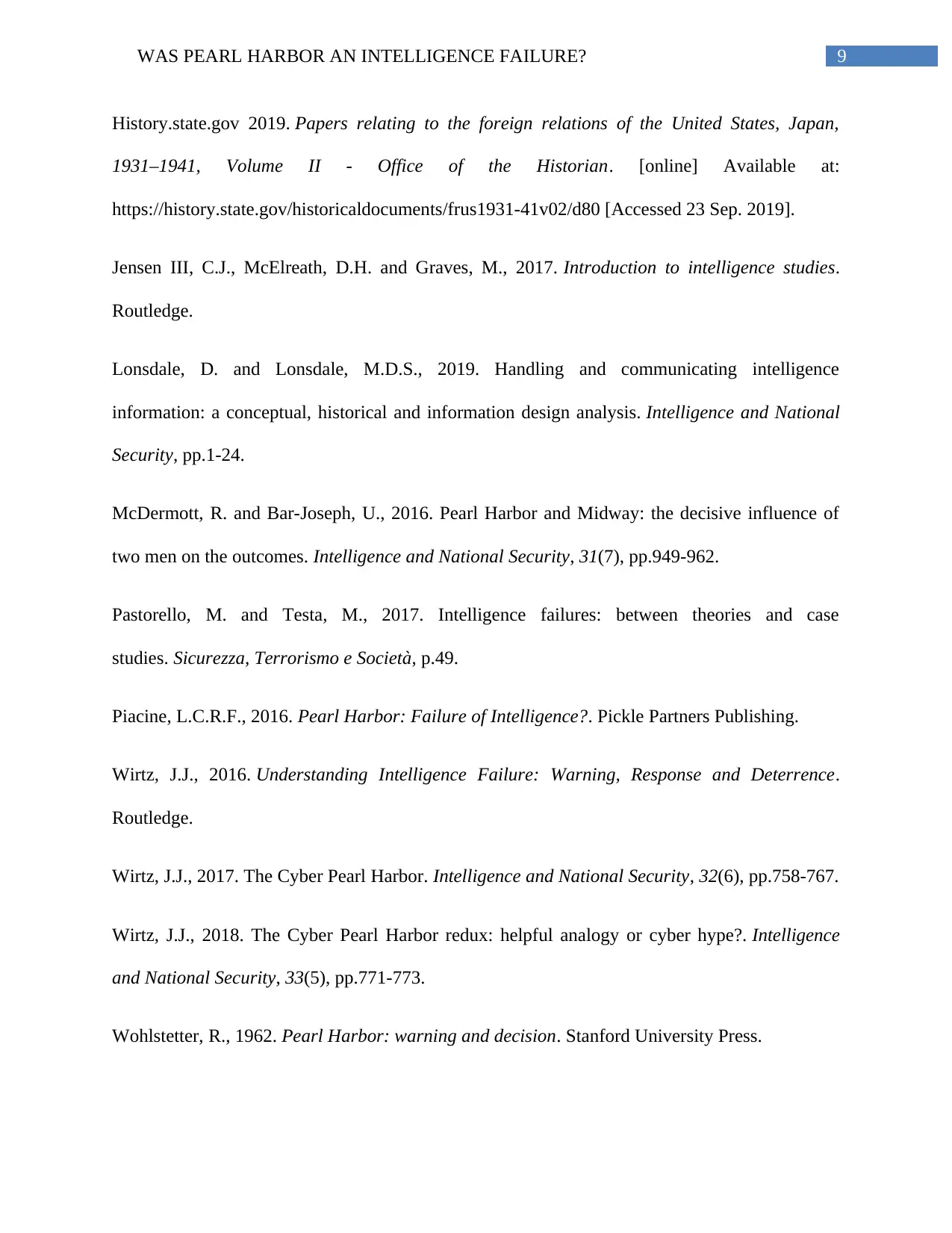
9WAS PEARL HARBOR AN INTELLIGENCE FAILURE?
History.state.gov 2019. Papers relating to the foreign relations of the United States, Japan,
1931–1941, Volume II - Office of the Historian. [online] Available at:
https://history.state.gov/historicaldocuments/frus1931-41v02/d80 [Accessed 23 Sep. 2019].
Jensen III, C.J., McElreath, D.H. and Graves, M., 2017. Introduction to intelligence studies.
Routledge.
Lonsdale, D. and Lonsdale, M.D.S., 2019. Handling and communicating intelligence
information: a conceptual, historical and information design analysis. Intelligence and National
Security, pp.1-24.
McDermott, R. and Bar-Joseph, U., 2016. Pearl Harbor and Midway: the decisive influence of
two men on the outcomes. Intelligence and National Security, 31(7), pp.949-962.
Pastorello, M. and Testa, M., 2017. Intelligence failures: between theories and case
studies. Sicurezza, Terrorismo e Società, p.49.
Piacine, L.C.R.F., 2016. Pearl Harbor: Failure of Intelligence?. Pickle Partners Publishing.
Wirtz, J.J., 2016. Understanding Intelligence Failure: Warning, Response and Deterrence.
Routledge.
Wirtz, J.J., 2017. The Cyber Pearl Harbor. Intelligence and National Security, 32(6), pp.758-767.
Wirtz, J.J., 2018. The Cyber Pearl Harbor redux: helpful analogy or cyber hype?. Intelligence
and National Security, 33(5), pp.771-773.
Wohlstetter, R., 1962. Pearl Harbor: warning and decision. Stanford University Press.
History.state.gov 2019. Papers relating to the foreign relations of the United States, Japan,
1931–1941, Volume II - Office of the Historian. [online] Available at:
https://history.state.gov/historicaldocuments/frus1931-41v02/d80 [Accessed 23 Sep. 2019].
Jensen III, C.J., McElreath, D.H. and Graves, M., 2017. Introduction to intelligence studies.
Routledge.
Lonsdale, D. and Lonsdale, M.D.S., 2019. Handling and communicating intelligence
information: a conceptual, historical and information design analysis. Intelligence and National
Security, pp.1-24.
McDermott, R. and Bar-Joseph, U., 2016. Pearl Harbor and Midway: the decisive influence of
two men on the outcomes. Intelligence and National Security, 31(7), pp.949-962.
Pastorello, M. and Testa, M., 2017. Intelligence failures: between theories and case
studies. Sicurezza, Terrorismo e Società, p.49.
Piacine, L.C.R.F., 2016. Pearl Harbor: Failure of Intelligence?. Pickle Partners Publishing.
Wirtz, J.J., 2016. Understanding Intelligence Failure: Warning, Response and Deterrence.
Routledge.
Wirtz, J.J., 2017. The Cyber Pearl Harbor. Intelligence and National Security, 32(6), pp.758-767.
Wirtz, J.J., 2018. The Cyber Pearl Harbor redux: helpful analogy or cyber hype?. Intelligence
and National Security, 33(5), pp.771-773.
Wohlstetter, R., 1962. Pearl Harbor: warning and decision. Stanford University Press.
1 out of 10
Related Documents
Your All-in-One AI-Powered Toolkit for Academic Success.
+13062052269
info@desklib.com
Available 24*7 on WhatsApp / Email
![[object Object]](/_next/static/media/star-bottom.7253800d.svg)
Unlock your academic potential
© 2024 | Zucol Services PVT LTD | All rights reserved.




